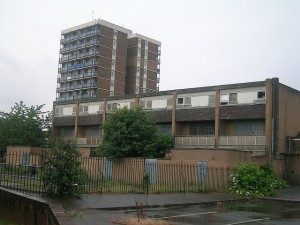Slum city: how Manchester will be hammered by welfare reforms
Article published: Tuesday, February 5th 2013
The Economist magazine might list Manchester in the top 50 most expensive cities in the world, but the Coalition government’s welfare reforms will see an explosion in homelessness, debt and slum landlords.

Thousands of low paid workers, the unemployed, people with disabilities and lone parents will be hit hard in a city which the Greater Manchester Poverty Commission has found to have the fourth highest level of deprivation in the country and 38 per cent of its children growing up in poverty.
Wages in Manchester are over £40 per week lower than the national average and 18 per cent of working age adults in the city rely on out-of-work benefits, around half of which are due to mental and physical ill health.
The impact of welfare cuts include:
• At least 12,300 social housing tenants will be clobbered by £14 to £25 a week “bedroom tax” penalties for having spare rooms • Manchester lacks sufficient social housing of a suitable size to accommodate all tenants forced to move. Rising homelessness and people leaving the city is expected • Almost 7,000 people may lose between £54 and £77 each week in Disability Living Allowance due to controversial computer-based assessments by the government contractor Atos • Up to 41 per cent of incapacity claimants in Manchester have been deemed fit for work since October 2008 in Atos assessments condemned as “inadequate” and causing “avoidable harm” by the British Medical Association • Over £45m will be taken out of the local economy as a result of the reforms, “only a proportion of which” will be recovered by people moving into work Tens of thousands of the city’s poorest will also pay higher proportions of council tax due to the government slashing council tax benefit and passing responsibility for administering support down to local authorities.
Social cleansing
Poorer wards with low employment and a high number of people with disabilities such as Harpurhey, Miles Platting, Newton Heath and Gorton, in addition to Sharston in Wythenshawe, will be hardest hit by the reforms.
Levels of personal debt are considered “likely to rise” as households struggle to make ends meet, with a high risk that people may resort to exorbitant “pay-day loan companies and other money lenders”.
Rent arrears and homelessness are expected to increase due to a lethal combination of such pressures and moves from October 2013 to bundle housing benefit into a single monthly Universal Credit paid to claimants rather than directly to landlords.
In an echo of London mayor Boris Johnson’s alarm at the prospect of “social cleansing” the report warns that new caps on housing benefit for private renters will force tenants on lower incomes out of expensive neighbourhoods and into poorer areas in the north and east of the city.
These renters may fall prey to slum landlords as housing benefit cuts “worsen conditions at the bottom end of the market” and incentivise the private rented sector to “target poor quality niche markets in already heavily disadvantaged areas”.
And ‘no DSS’ signs will make a comeback as “more reputable landlords may be reluctant to offer tenancies” to people on housing benefit.
The report also notes that 8,800 lone parents claiming income support have since May 2012 been expected to seek work once their children are over the age of five, despite a scarcity of jobs with hours flexible enough to fit around caring responsibilities as pointed out by the charity Gingerbread.
Human cost
The reforms will be implemented at the same time as the council is slashing its local services due to government cuts. Council officers say there will be a “significant impact on the services supporting families” in poorer areas.
Mike Stevens, director of neighbourhood services for Manchester City Council’s social housing wing Northwards, told Mule there would be “a real human cost to these changes”.
While Stevens said Northwards would do its best to assist people who need to move due to the reforms, he added that many people wish to remain in their homes and there could be difficulties in finding suitable housing for those who have to move.
“We simply don’t know whether we have the right mix of properties to be able to rehouse everyone who wants to move within a fairly short time”, he explained.
Stevens said the organisation was carrying out “an intensive door-knocking campaign to make sure they are aware of their options”. Northwards will also refer people to credit unions and their money advice service to try and help tenants cope with the changes without being forced to resort to payday loans and other expensive forms of finance.
He warned however that “the cumulative effects of the ‘bedroom tax’ and the changes to council tax benefit, as well as a general squeeze on household finances, means that we have to be prepared for a situation where some people will find themselves in difficulty.”
He added, “If it were as easy as people finding a job and moving off benefits then it wouldn’t be anywhere near as big a problem – but people’s lives are often more complicated than that, especially so in the current economic climate.”
Credit: Richard Goulding Manchester Mule <http: //manchestermule.com/article/slum-city-how-manchester-will-be-hammered-by-welfare-reforms

